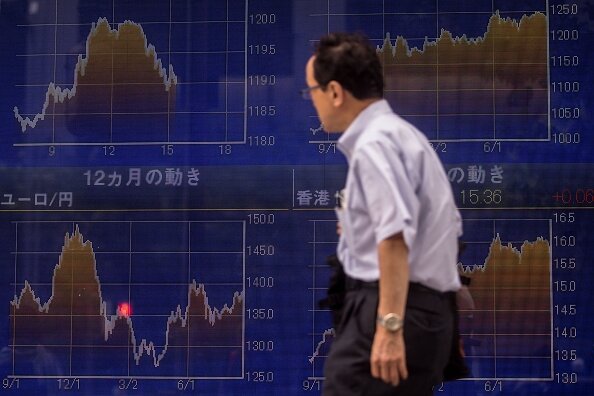– Reuters pic, September 21, 2015.Asian markets largely turned lower on Monday after the US Federal Reserve delayed an interest rate rise, with traders seeing the decision as a sign of weakness in the global economy despite initially welcoming it.
“It’s going to be a really tough week because we have the combination of [uncertainty] over what the People’s Bank of China (PBOC) and the Fed wants”.
Global markets have recoiled after the Fed opted on Thursday to hold rates steady, saying it would like to see further improvements in USA labour markets and inflation and stressing that the global economic outlook appeared less certain. The Dow Jones industrial average ended down 1.74 per cent at 16,384.79, while the S&P 500 finished down 1.61 per cent at 1,958.08 and the Nasdaq Composite closed 1.36 per cent lower at 4,827.23. Speaking to cheering crowds in a central Athens square, Tspiras said he “felt vindicated” after quitting in August to start on a clean slate with voters, Reuters reported.
China’s Shanghai Composite Index was up 0.4% Friday. Shares of the company are advancing more than 1%. I’d prefer if there was a U.S. rate rise once and for all, and that would clear away all the uncertainty. In early trades Monday, the local unit was trading at USD0.7185, down from Friday’s close of USD0.7228.
And on Sunday Premier Li Keqiang called for reforms to inefficient state-owned enterprises as part of a drive to reassure investors about Beijing’s handling of a crisis gripping the world’s number two economy.
Attention this week will now be on the release of preliminary Chinese factory activity data, the latest indicator on the health of the economy.
All four major lenders crashed between 2.4 and 3.2 percent, contributing significant downside pressure on the bourse. The bourse was down 1.1% for the week.
In the mining space, BHP Billiton (BHP) and Rio Tinto (RIO) are down more than 3% each, while Fortescue Metals is losing nearly 2%. Brent futures also rose 0.3 percent to $47.63.
Oil prices were slightly higher as USA drilling slowed, after slumping on Friday on the selloff in U.S. stocks.
Tech names such as Samsung Electronics and SK Hynix sagged more than 2% each, while Posco and Kepco eased 3.2% and 1.1% respectively.
Japan’s benchmark index, Nikkei 225 declined 362.06 points or 1.96 percent to trade at 18,070.21.
Asian shares and emerging currencies fell on Monday after the U.S.
The Malaysian ringgit (Exchange:MYR=) lost more than 1 percent of its value versus the greenback to trade at 4.250.
With Japanese markets closed through Wednesday for holidays, Australian and Korean stocks tracked losses in the U.S. from Friday as investors digested the Federal Reserve’s decision to stand pat on rates amid a month of market turmoil.
